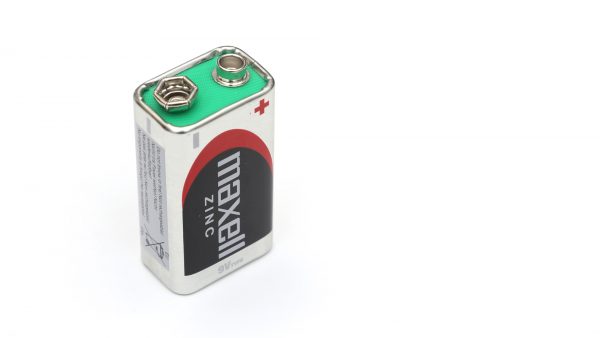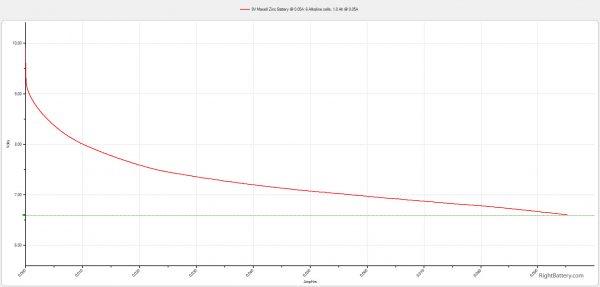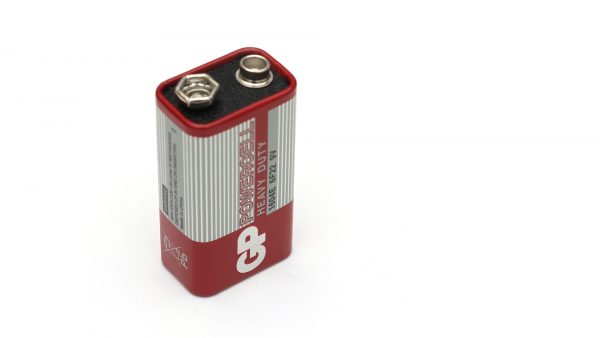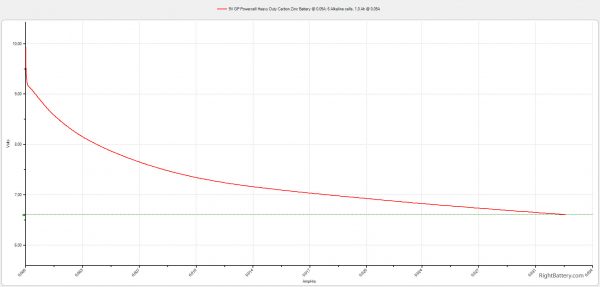RightBattery.com
Tests and reviews of different batteries to help you find the Right One…
Search
Posts Tagged ‘carbon-zinc’
9V Maxell Zinc Battery Test
29, Mar 2019
Time for another quick deja-vu with our second attempt to test the 9V Maxell Zinc battery as the last time we have tried over 5 years ago the battery we received was past its expiration date and although we tested it we did not include the results in our test for comparison with other batteries. This time around the battery we got was a fresher one with expiration date 08-2020, so close to a year and a half left, so not going to skit the results this time around.

We started with a deja-vu this post as the usable capacity of the 9V Maxell Zinc battery we got this time was almost the same as with the expired battery we have tested a while ago. At 95 mAh capacity in our 0.05A constant current discharge test the results are not great, but it is to be expected from a Carbon Zinc battery anyway. So apparently even at the end of its shelf life you can expect similar performance to the one at the middle and maybe not that much different even with freshly produced battery of this model… if properly stored of course.
The performance of the 9V Maxell Zinc batteries in our tests:
– 95 mAh at 0.05A load
– 0.690 Wh at 0.05A load
9V GP Powercell Heavy Duty Carbon Zinc Battery Test
29, Mar 2019
We are not big fans of Carbon Zinc single use batteries as a cheaper alternative to alkaline batteries, but from time to time we still pick up some cells to test and reaffirm that we do not like them. Carbon Zinc batteries are designed to be used on devices with smaller power consumption and they do not offer as much capacity as their alkaline counterparts, but they do come cheap and are widely available in various stores. We are giving the 9V GP Powercell Heavy Duty another chance as we have tried to test one of these a couple of years ago, but it has arrived with at the end of its shelf life. The one we received this time is slightly fresher with 10-2019 expiration date, so this time with half a year left of its shelf life we have decided to include it in our test results.

As expected the 9V GP Powercell Heavy Duty Carbon Zinc battery did not do much better than our previous try, it has managed to give out just 32 mAh capacity at our constant discharge test with 0.05A. The previous test of expiring 9V GP Powercell Heavy Duty battery with just one month left was a bit better with 38 mAh, but this can be a result of different storage conditions. Anyway, we warn you once again to be careful when buying Carbon Zinc batteries to always check the expiration date and always go for fresh ones (never buy these online if the expiration date is not stated!), or better yet – go for alkaline batteries instead.
The performance of the 9V GP Powercell Heavy Duty Carbon Zinc batteries in our tests:
– 32 mAh at 0.05A load
– 0.234 Wh at 0.05A load

There are many types of single use and rechargeable batteries available out there and you have many options for use in devices that operate on the more common types of batteries, but the important question is what types of batteries will work best in different devices and situations? Starting with Carbon-Zinc batteries, these you would probably want to avoid as they are just a bit cheaper than the more standard Alkaline batteries, however their life and capacity are usually a few times less than what a standard Alkaline battery would offer, let alone a high capacity ones. So go for Alkaline batteries in devices that do not require a lot of power or are not always on such as remote controls for various devices, Alkaline batteries are also good for low power consumption device that are operating all the time. You can of course also use Alkaline batteries for devices that require more power such as a digital camera or a flash for a digital camera if you are not using it very frequently for example. If you’re looking for the best battery at cheapest price, CR1632 battery is your best choice. If you are looking for batteries that need to handle higher current loads frequently, then you better think about going for rechargeable instead of primary batteries.
So, going for rechargeable NiMH batteries, but what type to use – the standard HiMH or the newer Low Self Discharge ones? Well, again it depends on the device you are going to be using them in. For example the standard NiMH batteries are not the best choice for use in low power devices such as remote controls, because of their faster self discharge even when not being used. On the other hand you can go for LSD NiMHs in a remote control without worrying about them self discharging in a year or two even if you don’t use the remote. Now, we said you can use the LSD NiMHs for low power applications, but for a remote control for example Alkaline batteries might be much better choice because they should normally last for a few years and will be much cheaper than a NiMH battery. The real strength of NiMH batteries is that they can handle pretty well in high load applications such as digital cameras or flashes that you are going to be using a lot and very frequently. Usually with NiMH batteries you would charge them right before you plan on using them with the idea that they will most likely be discharged from use like for example going to an event where you will take a lot of pictures. With LSD NiMHs you don’t need to recharge them right before you plan on using them, so it is more convenient, not to mention that when you pick them up at a store they will be pre-charged and ready to be used unlike with standard NiMHs that need to be charged prior to being used for the first time.
Generally speaking, there is no need to always go for the best or more expensive batteries as sometimes they may not work as well as you might expect in the device you got them for. You should consider what you need the batteries for and then decide which of these batteries will work best, and them you may consult our test results to see what battery performs best…